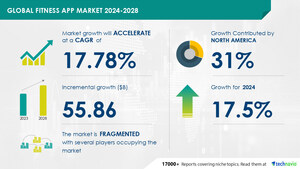NEW YORK, July 12, 2024 /PRNewswire/ -- The global iron drugs market size is estimated to grow by USD 4.58 billion from 2024-2028, according to Technavio. The market is estimated to grow at a CAGR of 10.87% during the forecast period. Growing prevalence of iron deficiency globally is driving market growth, with a trend towards growing number of ckd dialysis centers in emerging economies. However, side effects of oral administration of iron drugs poses a challenge. Key market players include Abbott Laboratories, AbbVie Inc., Alinter Group Ltd., Alora Pharmaceuticals LLC, Breckenridge Pharmaceutical Inc., Covis Pharma GmbH, CSL Ltd., Daiichi Sankyo Co. Ltd., DSE Health Care Solutions Inc., GlaxoSmithKline Plc, Hiral Labs Ltd., McKesson Corp., NovaFerrum, Pharmacosmos AS, The Procter and Gamble Co., Reckitt Benckiser Group Plc, Rockwell Medical Inc., Sanofi SA, Shield Therapeutics plc, and Zydus Lifesciences Ltd..
Get a detailed analysis on regions, market segments, customer landscape, and companies - Click for the snapshot of this report
Forecast period |
2024-2028 |
Base Year |
2023 |
Historic Data |
2018 - 2022 |
Segment Covered |
Product (Oral drug and IV drug), Age Group (Adult and Pediatric), and Geography (North America, Europe, Asia, and Rest of World (ROW)) |
Region Covered |
North America, Europe, Asia, and Rest of World (ROW) |
Key companies profiled |
Abbott Laboratories, AbbVie Inc., Alinter Group Ltd., Alora Pharmaceuticals LLC, Breckenridge Pharmaceutical Inc., Covis Pharma GmbH, CSL Ltd., Daiichi Sankyo Co. Ltd., DSE Health Care Solutions Inc., GlaxoSmithKline Plc, Hiral Labs Ltd., McKesson Corp., NovaFerrum, Pharmacosmos AS, The Procter and Gamble Co., Reckitt Benckiser Group Plc, Rockwell Medical Inc., Sanofi SA, Shield Therapeutics plc, and Zydus Lifesciences Ltd. |
Key Market Trends Fueling Growth
The emerging economies of China, India, and Brazil are experiencing a rise in the prevalence of Chronic Kidney Disease (CKD), leading to increased demand for renal anemia therapeutics. This trend is attracting vendors to invest in these markets. For instance, NephroPlus, Asia's leading dialysis network, announced a USD25 million investment in India to expand its operations in India and international markets. NephroPlus operates over 400 dialysis centers in India and various cities across 23 states. Additionally, healthcare start-up Renal Project in India secured USD0.3 million from angel investors to fund its expansion plans for micro dialysis centers. The growth of dialysis centers in emerging economies presents significant opportunities for vendors in the global iron drugs market.
The Iron Drugs Market is experiencing significant growth due to the rising prevalence of anemia and associated conditions. Prostate cancer, chemotherapy, and radiation therapy patients often develop anemia, leading to increased demand for iron drugs like Ferric Carboxymaltose and Monofer. Chronic Kidney Disease (CKD) patients, including those with CKD-related anemia, also require iron supplementation. Irritable Bowel Syndrome (IBS) and Hemoglobin deficiency patients also benefit from iron therapy. Transferrin saturation levels indicate iron deficiency, driving demand for iron drugs in various fields, including Nephrology, Gastroenterology, Oncology, Critical Care, Gynecology, and Infectious Diseases. IV iron drugs like Ferumoxytol Injection are preferred for their ease of administration and effectiveness in managing anemia caused by cancer, chronic kidney failure, and other conditions. Oral iron drugs are also available but may cause GI side effects. Anemia associated with postpartum, inflammatory bowel disease, and various infections, including malaria, HIV/AIDS, TB, hepatitis, pneumonia, and influenza, further expand the market.
Discover 360° analysis of this market. For complete information, schedule your consultation- Book Here!
Market Challenges
- The demand for oral iron drugs in the market may be hindered by the limitations of conventional oral therapies for anemia. Previously, oral iron drugs were the preferred treatment for iron deficiency. However, their use can present challenges due to poor gastrointestinal tolerance or absorption. These drugs must be taken multiple times daily and have been linked to side effects such as abdominal pain, nausea, flatulence, diarrhea, constipation, and black or tarry stools. The absorption of oral iron drugs is also restricted by inflammation caused by chronic kidney disease (CKD). Inflammation triggers the production of hepcidin, a liver protein that regulates iron homeostasis, which in turn inhibits the release of iron from macrophages, hepatocytes, and the intestinal absorption of iron. Consequently, the side effects of oral iron drugs can pose significant challenges to the expansion of the global iron drugs market during the forecast period.
- The Iron Drugs Market faces several challenges in addressing the needs of various patient populations. Gastrointestinal bleeding and kidney diseases, including dialysis, pose significant hurdles in ensuring effective iron replacement therapy. Celiac disease and Acute Kidney Injury add to the complexity, requiring specialized formulations. Teleconsultations and telemedicine offer potential solutions, but the adoption rate varies. Iron Dextran, Iron Sucrose, Ferric Carboxymaltose, Injectafer, Ferrinject, Iron Isomaltoside, Ferric Gluconate, Ferric Pyrophosphate Citrate, Ferumoxytol, Ferric Derisomaltose, and other iron formulations have unique advantages for different patient groups. Women's health, chronic heart failure, and Iron Deficiency Anaemia are key focus areas. However, challenges persist in addressing the needs of mothers and children, poor nations, and patients with rheumatoid arthritis, autoimmune diseases, renal issues, liver disorders, thyroid diseases, diabetes, hypertension, chronic renal disease, and cancer. Oral iron medications face side effects and digestive issues, while Erythropoiesis-stimulating Agents and heart health are also crucial considerations. Dialysis patients, lung cancer, breast cancer, blood cancer, bone cancer, and cervical cancer patients require specialized attention. The market must innovate to meet these diverse needs while ensuring affordability and safety.
For more insights on driver and challenges - Download a Sample Report
Segment Overview
This iron drugs market report extensively covers market segmentation by
- Product
- 1.1 Oral drug
- 1.2 IV drug
- Age Group
- 2.1 Adult
- 2.2 Pediatric
- Geography
- 3.1 North America
- 3.2 Europe
- 3.3 Asia
- 3.4 Rest of World (ROW)
1.1 Oral drug- Oral iron drugs are a common treatment for iron deficiency anemia, available in various forms, including ferrous sulfate, ferrous gluconate, ferrous fumarate, and iron polysaccharide complex. These supplements provide the body with additional iron to produce hemoglobin. Ferrous sulfate is the most widely used type, taken two to three times a day with food. Ferrous gluconate and ferrous fumarate are also available and typically taken once or twice a day with food. A newer type, iron polysaccharide complex, improves absorption and reduces side effects, taken once or twice a day with food. However, the risk of anaphylaxis with oral drugs has led to increased demand for advanced intravenous (IV) iron drugs. Vendors, such as AstraZeneca, have responded by developing new products, like FG-4592, a pill-form drug for chronic kidney disease (CKD) and end-stage renal disease (ESRD) patients, driving growth in the oral drug segment of the global iron drugs market.
For more information on market segmentation with geographical analysis including forecast (2024-2028) and historic data (2018 - 2022) - Download a Sample Report
Research Analysis
The Iron Drugs Market encompasses a range of iron-based medications used to treat various health conditions, including Chronic Kidney Disease, Inflammatory Bowel Disease, Cancer, and Anemia. These drugs are essential for the production of hemoglobin, a protein in red blood cells that carries oxygen to different parts of the body. Iron deficiency, often caused by malnutrition or blood loss, can lead to Anemia, affecting mothers and children in poor nations disproportionately. Ferric Carboxymaltose is a popular iron drug used in Chronic Kidney Disease patients to maintain iron balance and prevent Chronic Kidney Failure. In the context of Cancer, Iron Drugs are used to treat Cancer-induced Anemia. Monofer is another iron drug used to treat Iron Deficiency Anemia, while IV Iron (IRO) is used to treat Anemia in patients with Inflammatory Bowel Disease, among others. Iron Drugs also play a crucial role in managing Anemia associated with HIV/AIDS, TB, Malaria, Hepatitis, Pneumonia, and other infectious diseases. Moreover, they are used to treat autoimmune diseases like Rheumatoid Arthritis and Renal issues. However, Iron Drugs can cause GI side effects, limiting their usage in some cases. Transferrin saturation, a measure of the amount of iron bound to transferrin in the blood, is used to monitor the effectiveness of Iron Drug therapy.
Market Research Overview
The Iron Drugs Market encompasses a range of products used to treat various medical conditions, including chronic kidney disease, inflammatory bowel disease, cancer, and infectious diseases such as malaria, HIV/AIDS, TB, and hepatitis. IV (intravenous) and oral drugs like iron dextran, iron sucrose, ferric carboxymaltose, Injectafer, Ferrinject, iron isomaltoside, ferric gluconate, ferric pyrophosphate citrate, and ferric derisomalte are used to treat anemia, gastrointestinal adverse effects, kidney dialysis, and other conditions. These drugs are also used in women's health, chronic heart failure, and for mothers and children in poor nations. Additionally, they are used in the treatment of rheumatoid arthritis, autoimmune diseases, renal issues, liver disorders, thyroid diseases, diabetes, hypertension, chronic renal disease, and dialysis. Oral iron medications are also available, but they may cause side effects like digestive issues. Other conditions treated with iron drugs include anemia, cancer-induced anemia, and acute kidney injury. Teleconsultations and telemedicine have also emerged as important delivery channels for these drugs. Erythropoiesis-stimulating agents are used to boost the production of red blood cells and are used in the treatment of cancer and kidney disease. Iron drugs are also used in the treatment of various types of cancer, including lung, breast, blood, bone, cervical, and colon cancer, and in the treatment of chemotherapy and radiation therapy. Ferric Carboxy maltose is used in the treatment of chronic kidney disease. Other conditions treated with iron drugs include irritable bowel syndrome, hemoglobin deficiency, transferrin saturation, and postpartum anemia. The global iron drugs market is expected to grow significantly due to the increasing prevalence of anemia, chronic kidney disease, and cancer, as well as the growing demand for minimally invasive treatments and the increasing adoption of telemedicine.
Table of Contents:
1 Executive Summary
2 Market Landscape
3 Market Sizing
4 Historic Market Size
5 Five Forces Analysis
6 Market Segmentation
- Product
- Oral Drug
- IV Drug
- Age Group
- Adult
- Pediatric
- Geography
- North America
- Europe
- Asia
- Rest Of World (ROW)
7 Customer Landscape
8 Geographic Landscape
9 Drivers, Challenges, and Trends
10 Company Landscape
11 Company Analysis
12 Appendix
About Technavio
Technavio is a leading global technology research and advisory company. Their research and analysis focuses on emerging market trends and provides actionable insights to help businesses identify market opportunities and develop effective strategies to optimize their market positions.
With over 500 specialized analysts, Technavio's report library consists of more than 17,000 reports and counting, covering 800 technologies, spanning across 50 countries. Their client base consists of enterprises of all sizes, including more than 100 Fortune 500 companies. This growing client base relies on Technavio's comprehensive coverage, extensive research, and actionable market insights to identify opportunities in existing and potential markets and assess their competitive positions within changing market scenarios.
Contacts
Technavio Research
Jesse Maida
Media & Marketing Executive
US: +1 844 364 1100
UK: +44 203 893 3200
Email: [email protected]
Website: www.technavio.com/
SOURCE Technavio

WANT YOUR COMPANY'S NEWS FEATURED ON PRNEWSWIRE.COM?
Newsrooms &
Influencers
Digital Media
Outlets
Journalists
Opted In





Share this article